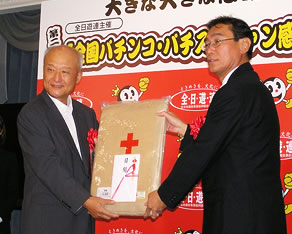Pachinko parlors scattered across Japan have long been promoting locally-oriented management to maintain good relations with local communities. On the other hand, the pachinko industry bodies and individual pachinko parlors have been taking measures to contribute to society through anticrime efforts, excluding organized crime syndicates, promoting youth development, traffic safety campaigns, etc., in cooperation with the government, local governments, and related bodies. Recently, locally-oriented management and local community contributions have become increasingly important in terms of corporate social responsibility (CSR) and emphasizes transparency and soundness of the pachinko industry.

The pachinko parlors belonging to Zennihon Yugi Jigyo Kyodo Kumiai Rengokai or Zennichi Yuren (Japan Federation of Gaming Business Associations) donated a total of 1.72 billion yen to charity last year. Their donations are being used in various fields. The All Japan Organization of Social Contribution (AJOSC), which was established in response to Zennichi Yuren’s approach, provide promotion services for researches and activities necessary in society. In addition, the AJOSC supports a series of activities that informs the public of the activities of members in each area through means such as giving awards for best community activities every year. Many community activities have been reported so far. In particular, it should be noted that devoted efforts in terms of both physical and mental aspects, such as the dispatch of manpower for reconstruction activities, as well as the provision of cash donations and goods, to the areas destroyed by the 2011 Tohoku Earthquake and Tsunami have been made.
On the other hand, individual pachinko parlors are vigorously advancing their activities across Japan. They cover a wide range of activities including cleanup around pachinko parlors, participation in local events, visits to foster homes during the Christmas season, holding of flea markets in their parking lots, pachinko contests for elderly and disabled people, and baseball training sessions for school children. Based on the lessons from the 2011 Tohoku Earthquake and Tsunami, pachinko parking lots are expected to be used for emergency evacuation purposes and agreements on provision of food stuff and stockpiles of other goods as relief supplies are often made at the municipal level. There have been an increase in activities adapted to the needs of the times and society. Game machine manufacturers and related trading companies, as well as pachinko parlors, are also undertaking vigorous activities such as making donations, holding events to support the reconstruction of disaster-affected areas, and promoting forest conservation/blood donations. In this way the pachinko industry is actively involved in making local communities as better place.